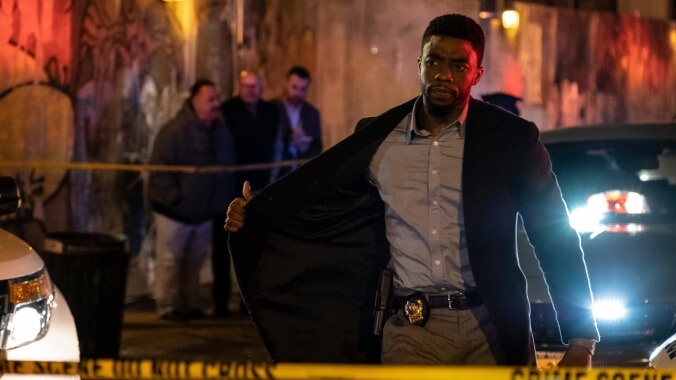Chadwick Boseman gets a non-superhero star vehicle with the solid throwback 21 Bridges


Much of Chadwick Boseman’s career as a big-screen leading man has consisted of him playing iconic figures, both historical (Jackie Robinson, Thurgood Marshall, James Brown) and fictional (Black Panther). Andre Davis, his character in 21 Bridges, is by most standards a movie-star part, with the attendant amplifications: He’s a sharp, tough, well-known NYPD detective whose relentless pursuit of justice is motivated by a standard-issue tragedy in his past. But compared to the storied accomplishments of his past roles (no matter how well Boseman conveyed their nuances and humanity), this supercop seems almost like a regular guy. Seeing Boseman in an efficient, workaday crime thriller carries an unusual and pleasing novelty.
21 Bridges also derives some novelty, perhaps unearned, from the marketplace that surrounds it; mainstream crime pictures no longer feel as common as, say, biopics or superhero movies. Part of the challenge of making a contemporary police thriller is the increased awareness of systemic injustices and misconduct related to police forces, something 21 Bridges addresses in a sidelong, ginger sort of way. Andre’s unseen previous decade on the force (as well as his cop father’s death on the job) has earned him a reputation as a killer of cop-killers, mostly celebrated but regarded with some wariness. He’s placed in interviews with Internal Affairs to check up on his conduct (he righteously dismisses their concerns early in the film) on the same day he’s assigned to a high-profile case, a robbery-turned-bloodbath that results in more than half a dozen dead cops.
This robbery, a small-scale drug heist perpetrated by a hotheaded tough guy (Taylor Kitsch) and his more cautious partner (Stephan James), is shown from the criminals’ point of view, and 21 Bridges spends a fair amount of time cutting back and forth between their scrambling and the police, hot on their tail. The film’s title derives from an absurd scheme that resembles something out of a more heightened big-ticket action movie: Once Andre and a fellow detective (Sienna Miller) figure out that the suspects are in Manhattan, they decide to shut down all of the island’s entrances and exits until dawn (including all those bridges, plus all railroads and subways), to keep them from disappearing into one of the other boroughs. As they track their panicked quarry, Andre starts to suspect, correctly, that there’s something fishy going on, beyond cops killed over some cocaine.
The particulars of that fishiness are not especially interesting. 21 Bridges touches upon the weak ethics of a shoot-first approach to policing (even or especially when dealing with suspected cop-killers), but like so many police thrillers, it looks for unearned moral clarity by focusing on more blatant dirty-cop corruption favored by, well, thrillers that require an easy bad guy. It wants to feel au courant, so long as it stays within the boundaries of mass-appeal pulp. This is especially evident in the movie’s odd, tentative relationship to its New York City setting, not least because much of the movie was actually shot in Philadelphia. Lacking much recognizable New York atmosphere, the movie has to rely on helicopter shots, exaggerated accents, one scene at Grand Central Station, and a few references to real-life politics. (Despite the fictional name of the New York mayor, references to tensions with the police department and a habit of eating pizza with a knife and fork make clear that the movie has Bill DiBlasio in mind.)
The screenplay, by Adam Mervis and Matthew Michael Carnahan, value its dialogue, savoring the sniping and tough talk among cops and criminals without getting too ostentatious about it. Director Brian Kirk also knows when to pull back on the chatter; Andre’s first survey of the crime scene is dialogue-free, with the strong musical score by Henry Jackman and Alex Belcher driving the action, and Kirk’s foot-chase sequences have a bruising tactility. This is a well-crafted, exciting movie, sometimes more impressive for maintaining those qualities in the face of an utterly unsurprising story.
The performances are part of that craft, particularly James as a criminal whose desperation never overpowers his resourcefulness, and Boseman, as the detective who finds himself quietly questioning (though not really interrogating) his past track record. The star’s murmured version of a New York-ish accent sounds a little like something Tom Hardy might come up with, but otherwise he’s working in the grounded, unfussy mode of a ’90s movie star. Like so many actors who have logged time in pretend law enforcement, Boseman’s skills could probably be put to better use. Some genre slumming, however, may not be avoidable; even in a time when star vehicles are fewer and further between, his level of charisma seems to generate them almost automatically. Better to just enjoy the throwback.